UFC Fight Night 228 Beforemath: Will Rafael Fiziev’s Takedown Defense Hold Up?
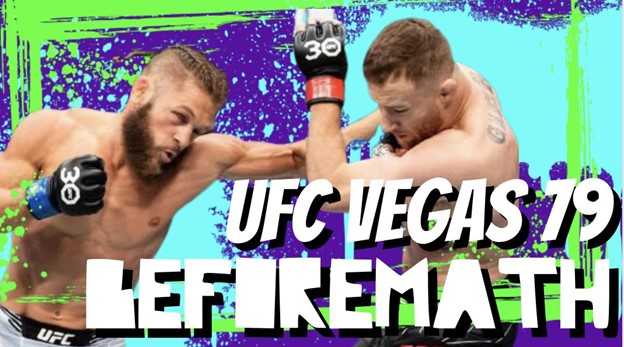
Blaine Henry/Sherdog.com illustration
The Apex will once again be our venue as the UFC puts on an all-Eurasian showdown in the main event of “UFC Vegas 79.” Azerbaijan’s Rafael Fiziev is taking on Poland’s Mateusz Gamrot in a classic striker-versus-grappler bout and will be a turning point in the career of the winner. In today’s Beforemath column we aim to break the fight down in an analytical sense and answer some key questions. Can Fiziev’s 90% takedown defense hold up to the chain wrestling of Gamrot? Will Gamrot be able to even box into clinch situations to get to said chain wrestling? Let’s find out.
Advertisement
Gamrot: Persistence is key
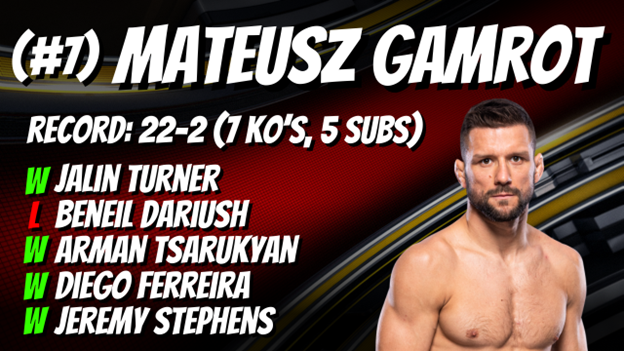
Blaine Henry/Sherdog.com illustration
Like Fiziev, Gamrot was given an opportunity to make the leap against the elite of the lightweight division. He took on Beneil Dariush and was denied any sort of takedown. His rise to the fight was quick and he bounced back after the loss well against the long-limbed Jalin Turner in his last fight.
For Gamrot, the takedown is the entirety of the fight. If he can
get you down, the fight is going to be a long night unless your
name is Arman
Tsarukyan. Against Dariush, Gamrot was able to get Dariush down
four times on the night. The caveat is those were achieved on 19
attempts. Dariush denied the majority of the attempts on the night.
If Gamrot cannot get to the ground, Fiziev will eat him alive on
the feet.
Gamrot is all about chain wrestling. It sets him apart from the rest of the grapplers in the UFC, with very few exceptions. It all starts at the shot. Shown above, a double leg takedown entry is something Gamrot does often. From here, he either completes the takedown or looks for something else in the scramble. With Fiziev having a 90% takedown defense, the original shot for Gamrot will not be where the takedown stops for the majority of the fight. Scrambles and transitions will be major factors for Gamrot.
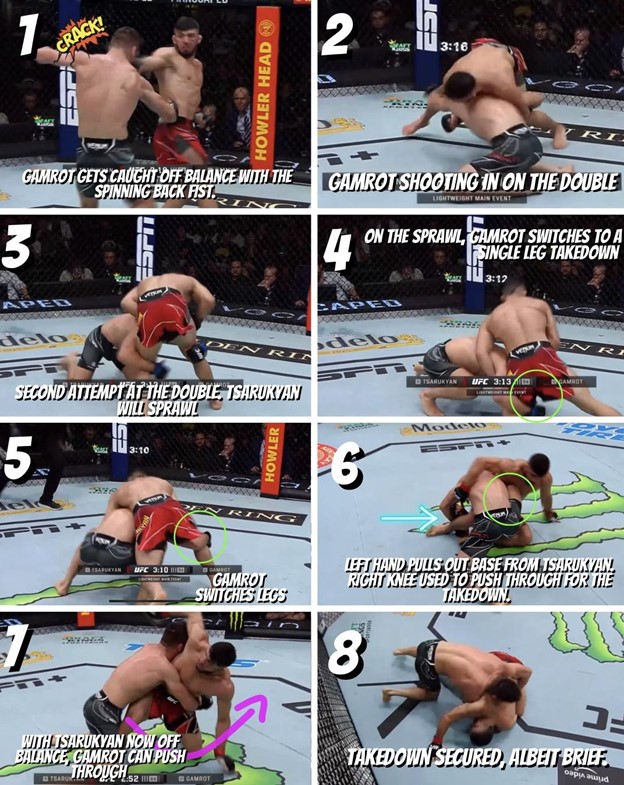
Blaine Henry/Sherdog.com illustration
The scrambles against Tsarukyan were a work of art from both fighters. They also gave us plenty of opportunities to see chain wrestling from Gamrot. (1) Tsarukyan lands a spinning back fist that stuns Gamrot, a situation he may find himself in against Fiziev. As he’s dropped, Gamrot (2) shoots in on the double leg. Tsarukyan manages to sprawl and get free and (3) Gamrot goes around and stays in on the double. (4) Tsarukyan continues his sprawl and Gamrot will switch his left hand and swap to a single leg takedown.
At this point, we are three takedown “attempts” deep. Technically this is one attempt with multiple entries. Being as knowledgeable as he is, Tsarukyan (5) spins out from the single leg and Gamrot switches from the left leg to the right side single. (6) Now Tsarukyan is on the mat and has a hand down, posting up. Gamrot will (7) come up on the body lock and (8) complete the brief takedown.
Look at how complicated that grappling exchange is. Four transitions in one brief exchange and he gets the takedown on the incredibly tough Armenian. This persistence is what makes Gamrot such a nightmare for opponents. The issue is that he will have to get to these positions on Fiziev. All fights start on the feet and if Fiziev can thwart an attempt, or deny entry in the first place, Gamrot will look like he did against Dariush.
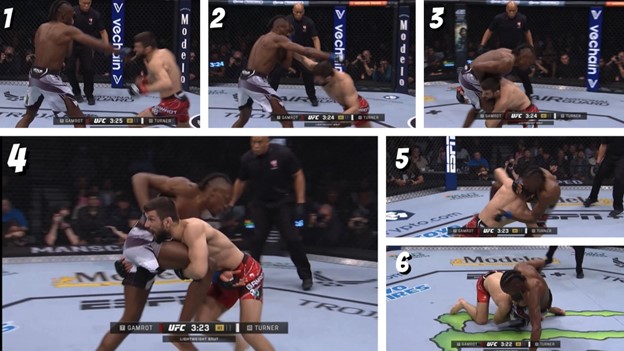
Blaine Henry/Sherdog.com illustration
Turner is a long fighter and uses his reach well. Gamrot can use similar entries on Fiziev to counteract his speed. Case in point: the knee tap. (1) Turner throws out a jab and Gamrot will dip to the outside of the punch. With his head off the center line and to the outside, he’s protected better from the left cross. Turner can still come over the top of Gamrot’s (2) overhand right as he throws it but he will have to be quick with his hands and the pivot. As Gamrot throws the right, he allows his dip to extend a little further and hangs his left hand down low. This allows him to (3) grab the left lead leg of Turner and grab behind for that double leg takedown. Gamrot (4) lifts up on the lead leg and drives through and (5) around for the (6) takedown.
Entries like this against Fiziev will not be easy for Gamrot. Fiziev is strong in the clinch and quick on the feet. Gamrot, who uses 1’s and 2’s to box his way into a clinch will have to be more creative.
Before his time in Bellator MMA, Aaron Pico was once the hottest prospect in wrestling. In the Olympic team trials, he came up short but not before thwarting Jordan Oliver who would, coincidentally, also become a Bellator fighter. To get in on the fast Oliver, Aaron Pico would make use of the foot stomp to slow him down and grab the legs.
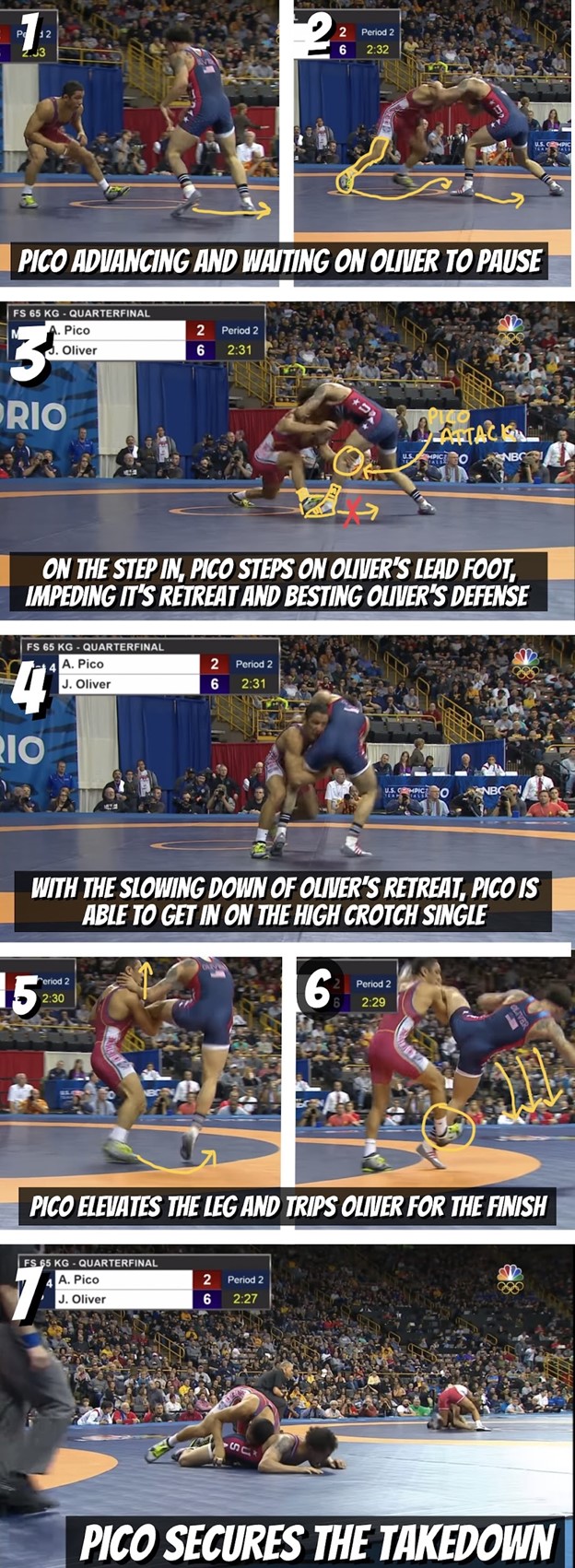
Blaine Henry/Sherdog.com illustration
Up 6-2, Oliver is not being aggressive and engaging with Pico. (1) He moves laterally and looks to avoid any type of attack coming his way. Pico struggled to be quick enough to get to Oliver. Just as Oliver hesitates, Pico (2) clinches up with Oliver. As Oliver keeps his hips back, (3) Pico steps in deep with his rear leg onto the shoe of Oliver. As he’s doing this, he grabs the leg with the left hand. By stepping on his foot, Pico slows Oliver down just enough to get a hold of him and begin a scramble. Pico (4) locks in the legs and (5) stands up with Oliver. Oliver is forced to hop around on one leg and as Pico lifts, Oliver is forced to come closer to Pico. Doing so, (6) Aaron Pico can get the trip on Oliver’s posted leg and (7) the takedown.
The foot stomp is used in boxing, wrestling, and many other places. While it’s technically illegal in boxing, it’s still used in the southpaw versus orthodox matchup. But Pico showed here that the foot stomp can be done from a bladed stance, that is southpaw versus southpaw or orthodox versus orthodox. Stepping in deep like this will be the types of explosive movements Gamrot will need to get Fiziev to the ground before he can really lock in his patented takedown defense.
Gamrot’s experience will be his best friend here. He knows where he’s better than Fiziev, much like the rest of the world. It’s on him to execute and get the fight to where he can find a way to win. Easier said than done when it comes to Fiziev, however.
Fiziev: The skills to win
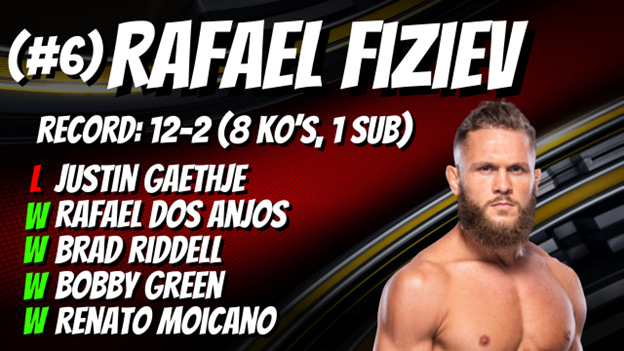
Blaine Henry/Sherdog.com illustration
After his loss to Justin Gaethje, Fiziev was put to the back of the lightweight line. His 90% takedown defense still looms heavy over this fight, however. Fiziev is notoriously hard to take down and that’s good news for him against a fighter like Gamrot. If you can deny Gamrot the takedown, he’s quite one dimensional on the feet.
He likes to shoot for doubles and he likes to grab the leg on the overhand right. If Fiziev can keep his distance and mind the right, he is in store for a highlight night, perhaps even a finish. Fiziev will be able to do what he does on the feet only if he can keep Gamrot away. For this he will need to work the body and deny shots to have Gamrot huffing and puffing as the fight goes on. The burden lies on Fiziev to keep him away. The good news for “Ataman” is that he possesses all the tools to do so.
The push kick, as seen in the animation above, has been all the rage against an advancing opponent recently. It’s a strike to the body (check by cardio), it’s a long weapon and likely won’t be countered by a fighter like Gamrot (check by safety and distance), and it keeps an advancing opponent away (check by distance management). Fiziev does use the push kick, but I would expect to see it a bit more from him at UFC Vegas 79. If he can do this quick and snappy, it will wear Gamrot down massively and have Fiziev in the driver’s seat, but Gamrot is going to keep coming and there’s a chance he gets into a clinch. So what to do then?
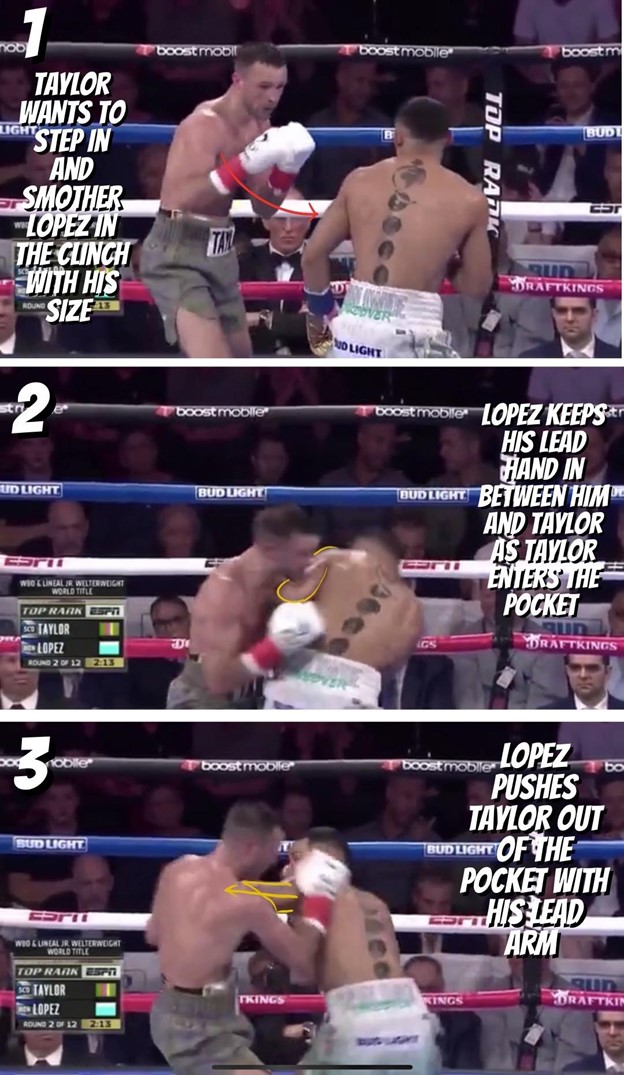
Blaine Henry/Sherdog.com illustration
We will look to the sport of boxing for this, specifically Teofimo Lopez. Lopez managed to keep both Vasyl Lomachenko and Josh Taylor, two of boxing’s better in-fighters today, out of a clinch with a simple shove. In the above example, (1) Taylor is pressing forward and (2) gets in close to lean on Lopez. But Lopez has his lead arm down and between he and Taylor. He then (3) shoves him back and out of the pocket. While this isn’t optimal for anti-wrestling, it’s still good in a pinch. Fiziev can use this to bully Gamrot around as he comes forward relentlessly.
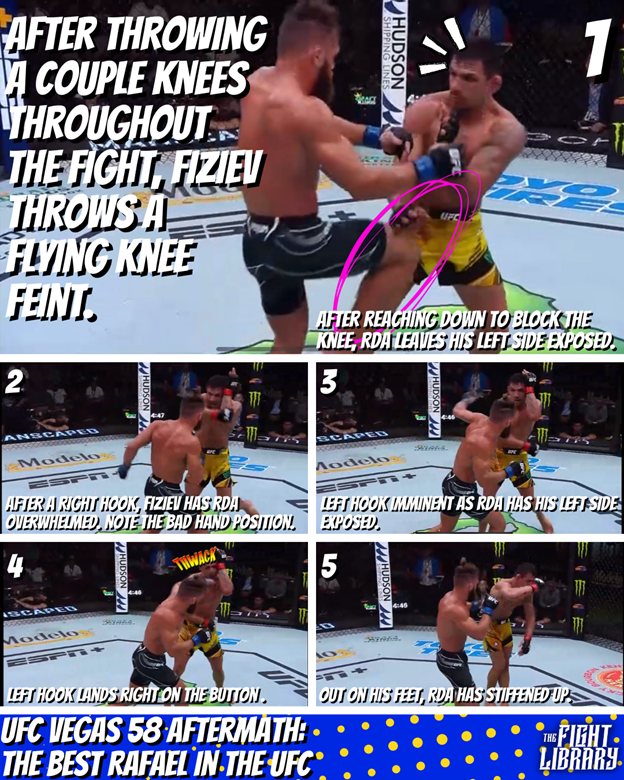
Blaine Henry/Sherdog.com illustration
Then, of course, there are the knees. Fiziev throws devastating step-in knees that have punished opponents like Rafael dos Anjos, who also relentlessly comes forward. Dos Anjos, however, likes to work against the fence, though he will start takedown attempts in the center of the cage and push to the fence at times. Throughout the fight, as Dos Anjos came forward, Fiziev would (1) throw a knee up the middle and to the body. This took the wind out of Dos Anjos’s sails and paid off in round 5. Dos Anjos starts to react and lower his hands to try to block the kick. As his hands are down, (2) Fiziev comes with a left hook and Dos Anjos has his guard up for a right. (3) with the hand lowered, Fiziev has a straight shot to (4) land a left hook from orthodox that (5) stiffens up Dos Anjos on the feet.
With these tools, as well as the feints from Fiziev, he can give Gamrot a hard time and have him whiffing at air in the process. Fiziev hits hard and is incredibly strong in the clinch. All that is left for him is to do is to execute.
This fight is truly simple: if it stays on the feet, Fiziev should win. If it goes to the ground, bet the house on Gamrot. Styles make fights and these types of fights are what MMA and the UFC built its name on. Which style works best? We’ve moved on past that as a sport for the most part and being well rounded is almost always required unless you’re an uber-specialist. These two are simply specialists. A stadium muay thai fighter against an ADCC grappler: What more could you ask for?
« Previous Preview: UFC Fight Night 228 ‘Fiziev vs. Gamrot’
Next Mateusz Gamrot Looking to Make a Statement With a Finish Over Rafael Fiziev »
More




 UFC News & Features
UFC News & Features

